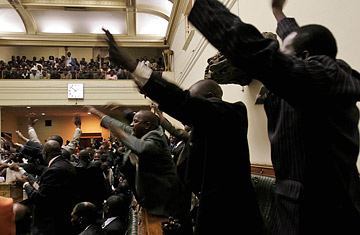
MDC members celebrate in parliament after their colleague, Lovemore Moyo, was elected Speaker of Parliament in Harare, Zimbabwe,
With Zimbabwe's economy in ruins, millions of its people living as refugees abroad and its security forces beating, torturing and killing dissenters to Robert Mugabe's regime on a daily basis, Zimbabwe's opposition could be forgiven for having a few things to get off their chests. On Tuesday, they did. For the first time in living memory, 84-year-old Mugabe, who has ruled Zimbabwe with an iron fist for 28 years, was heckled and drowned out in parliament. As Mugabe tried to deliver a keynote speech opening a new session of parliament, opposition members — who now form a majority in the assembly and reject Mugabe's authority to call them together — broke out in whistles, shouts and even song. From the opposition benches, where the MPs refused to stand, a chorus of "Zanu Yaora" rang out, meaning 'Zanu is rotten.' (Zanu is the shortened acronym for Mugabe's party, the Zanu-PF or Zimbabwean African Union-Patriotic Front.) Mugabe tried to ignore the noise and continued to speak but many of his words were lost.
The scenes were an unprecedented public show of defiance from the opposition Movement for Democratic Change (M.D.C.). The party won a parliamentary majority in the first round of a general election on March 29, and its leader, Morgan Tsvangirai, bested Mugabe in the presidential election, without winning an outright majority. That was the cue for the security forces and their allied militias to unleash a wave of repression which Human Rights Watch says resulted in the deaths of 166 opposition supporters and activists, more than 5,000 injured and tens of thousands of Zimbabweans displaced. Three months of that was enough to persuade Tsvangirai to withdraw, and Mugabe "won" a second round of the presidential election unopposed in late June. But so blatant was the regime's conduct that Mugabe drew unprecedented criticism from within Africa — something that appeared to have persuaded him to open power-sharing talks with the M.D.C. Now a month old, those talks have stalled and, perhaps in an attempt to continue his one-man rule, Mugabe announced last week that he would appoint ministers and regional governors and convene parliament. If that was his intent, it backfired. On Monday, M.D.C. MPs elected one of their own as speaker of the house. Tuesday's scenes were perhaps even more humiliating for the octogenarian president.
The day began badly for Mugabe when, displaying scant regard for the poverty of his people, he arrived at parliament in a Rolls Royce, his chief adjutants trailing in Mercedes. "No wonder why these people don't want to relinquish power," an onlooker shouted at massed police lines guarding the building. "Who would want to leave such high life? The cost of these cars alone would pull Zimbabwe out of its mess!"
Nearby, queues formed outside a bank as Zimbabweans waited to withdraw remittances sent from abroad by relatives. When a 21-gun salute sounded in Mugabe's honor, people scattered, as though they expected reprisals. The mood of rebellion seemed to infect the ranks of Harare's political analysts too. Though few could hear him, Mugabe vowed in his speech to tackle corruption and provide food. Political analyst Fred Musayengana dismissed the address as lacking substance. "There is really nothing to talk about in the President's speech," he says. "It is hollow. It does not address fundamental issues like employment, increased production and how Zimbabwe might become self-sufficient." With reporting by correspondents inside Zimbabwe
